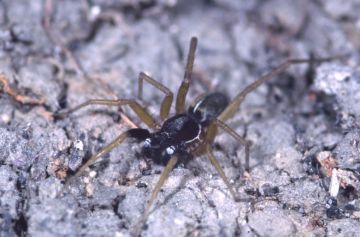Summary for Aulonia albimana (Araneae)
previous species | next species
National Distribution
Terms of Use. Double-click on map to go to region

Explore Regional Distribution
Please log on and add a note on this species
About this species
Recorded altitude range
Species text
DistributionThe species was recorded from two quarries near Dunster, South Somerset, one in 1936 and 1938 and the second on a number of occasions between 1963 and 1974. It is presumed to be extinct now in Somerset, as the original habitat has been lost. Although there is open heathland and woodland adjacent to the Dunster sites which may still support this species, searches in 2000 by a number of arachnologists were unsuccessful. It was discovered at Newtown Ranges, Isle of Wight, in 1985. This is a distinctive spider so is unlikely to be overlooked elsewhere. It is fairly widespread in western and central Europe.
Habitat and ecology
Grassland. A. albimana was found among stones at the side of a disused quarry and running on the quarry floor in Somerset. The Isle of Wight site is a damp grassy area sheltered from the wind on three sides but open to the sun. Adults were found at the end of June in a tiny hollow in the soil at the base of dense grass stems. Juveniles had previously been found in the same area in May. On the continent the spider occurs in a wide range of habitats. In Germany, this species has been observed to make a flimsy sheet web with a tubular retreat in moss. In France, the spiders have been found with their sheet webs on the ground amongst tussocky grass and in litter amongst open herbage.
Status
The spider is currently suspected to survive at only one site in Britain, but has not been recorded there since the 1980s, and a survey in 2007 failed to relocate it (Wright 2008). It is probably extinct at its two earlier locations where the habitat has been lost.
Threats
The quarry near Dunster from which it was recorded in the 1960s and 1970s has been used as a rubbish tip, a common fate of disused quarries. The site of the earlier records has also apparently been destroyed. The site on the Isle of Wight is on military land with restricted access, so there is no immediate threat to the existence of the overall site. The exact location there has become scrubbed over and shaded, but there is still suitable habitat close by (Wright 2008).
Management and conservation
Scrub clearance in its 1985 location is desirable, plus further survey work to ascertain whether it is still present in the area.
Text based on Dawson, I.K., Harvey, P.R., Merrett, P. & Russell-Smith, A.R. (in prep.). References
Adult Season
Habitats
background methodology
Recorded management for locations with Aulonia albimana
Recorded substrate and hydrology for locations with Aulonia albimana
Images
please log on and upload a new image for this speciesSee also A-Z Species Index - A-Z Picture Index - previous species | next species

